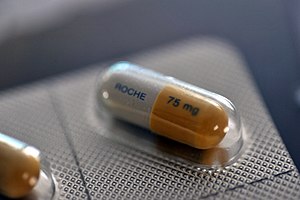| Tamiflu medicine pill by a Swiss company Roche against Influenza A (H1N1) virus causing the 2009 flu pandemic. (Photo credit: Wikipedia) |
Chicago, Mar.7, stock tips .- The following conversation took place between my wife and me a few months ago.
Mrs. L: I really think you should get a flu shot this year.
Me: I've never gotten one before and I've never come down with the flu.
Mrs. L.: It's supposed to be a really bad flu this season.
Me: I'm Superman, I don't get the flu.
I'm sure you can guess what happened.
I made it through most of flu season unscathed, as friends and family around me dropped like bad guys in a video game. Meanwhile, I was eating right, exercising and getting enough sleep. No way the flu was going to get me and my Clark Kent-like immune system.
And then it did. Last week.
I was as sick as I've ever been. I don't remember Thursday.
Fortunately, I'm on the mend and back to thinking about stocks.
And not surprisingly, an area I'm thinking about is flu stocks.
Even in my delirium, I knew there were big bucks in some stocks that have products related to the flu. When my wife called from the pharmacy to tell me that my Tamiflu prescription was going to be $105 (and that's with health insurance), I knew someone was making a bundle off my misery.
Roche Holdings (OTC: RHHBY) - The beautiful people who make Tamiflu. Two doses and I was on the road to recovery. It was worth every penny of that $105.
Tamiflu sales are expected to more than double this flu season to $750 million from $350 million last year. Roche is a huge company with $45 billion in sales, so the growth in Tamiflu won't move the needle much. But it can in the future if there's a pandemic. In 2009, sales hit $3 billion as governments stockpiled Tamiflu on pandemic fears.
Sanofi (NYSE: SNY) - The smart people whose product I should have used. Sanofi is the largest flu vaccine provider in the United States. In 2012, flu vaccines brought in $884 million in sales. GlaxoSmithKline (NYSE: GSK) and Novartis (NYSE: NVS) also make flu vaccines.
Sponsored
The Most Profitable Company in the History of the World?Standard Oil... Saudi Aramco... The Dutch East India Company... These companies were bigger and more profitable than any single company on the planet today. But one company could be on the verge of joining their ranks. It's already more profitable than just about every company on the globe. And yet, you've likely never heard of it. Details here. |
There are several small companies working on the vaccines, like Inovio (NYSE: INO) and Vical (Nasdaq: VICL), but I would stay with the big pharmaceutical companies on this one. The small names don't have a good track record of being able to bring a product to the market. And even if they succeed, they would have to partner with a larger company for its sales network.
That doesn't mean you should never invest in a small-cap biotech company. Many have some great breakthroughs in various diseases, especially cancer. But many of these indications are wide open markets, or the drug is such an improvement that the company will take significant market share.
With flu vaccines dominated by big pharma, it will be tough for a small fry to break in and be successful.
Walgreens (NYSE: WAG) - Not only can you buy your Tamiflu, decongestants and ibuprofen at Walgreens, you can also get your flu shot at the pharmacy. In fact, 6.9 million people did as of January 31. That compares to 5.5 million the year before. And if those people are already in the store, chances are they're also picking up a box of band-aids, a two-liter bottle of soda, or some other household items they may need. In fact, Walgreens reported a strong 6% increase in sales in January.
Pilgrim's Pride (Nasdaq: PPC) - While the Tamiflu appeared to help me, it might have just been a coincidence. After all, I'd been eating homemade chicken soup for several days prior.
Pilgrim's Pride processes about 9.5 billion pounds of chicken annually. The company offers fresh and frozen whole chickens and parts.
While Pilgrim's isn't exactly a biotech or pharma company, its products are used to make the best medicine I know of.
And it's not just an old wives' tale. Several medical studies have shown that chicken soup actually does help. One study out of the University of Nebraska Medical Center concluded that chicken soup stopped the movement of white blood cells that fight infection. By inhibiting their movement, upper respiratory symptoms were reduced. Another study showed that chicken soup increased air flow in the nasal cavity.
Next year, the vaccine makers can count on me to add one more to their rolls. And I'm going early. As much as I loved the Tamiflu, I'd prefer not to have to take it again.
...


No comments:
Post a Comment